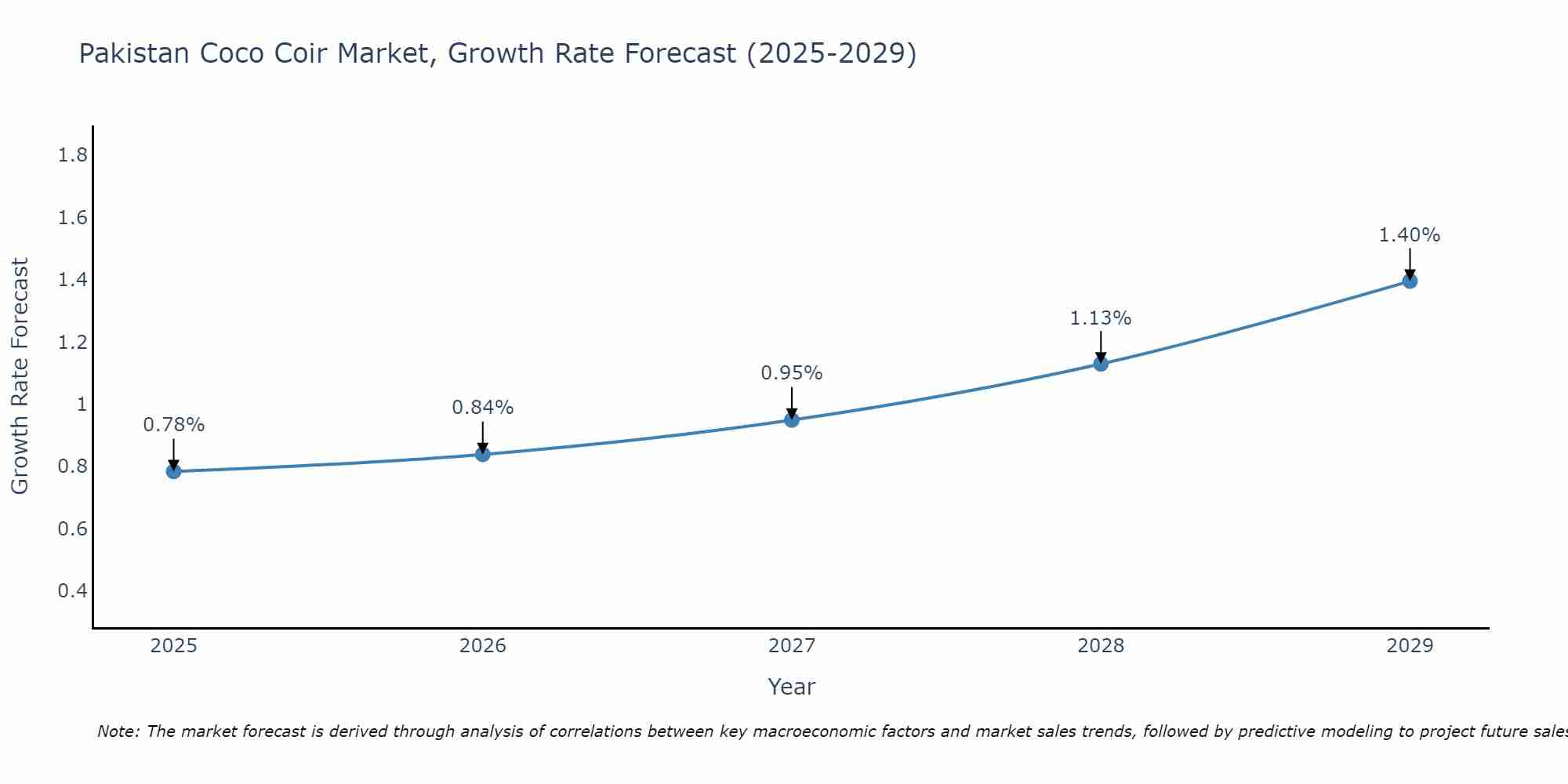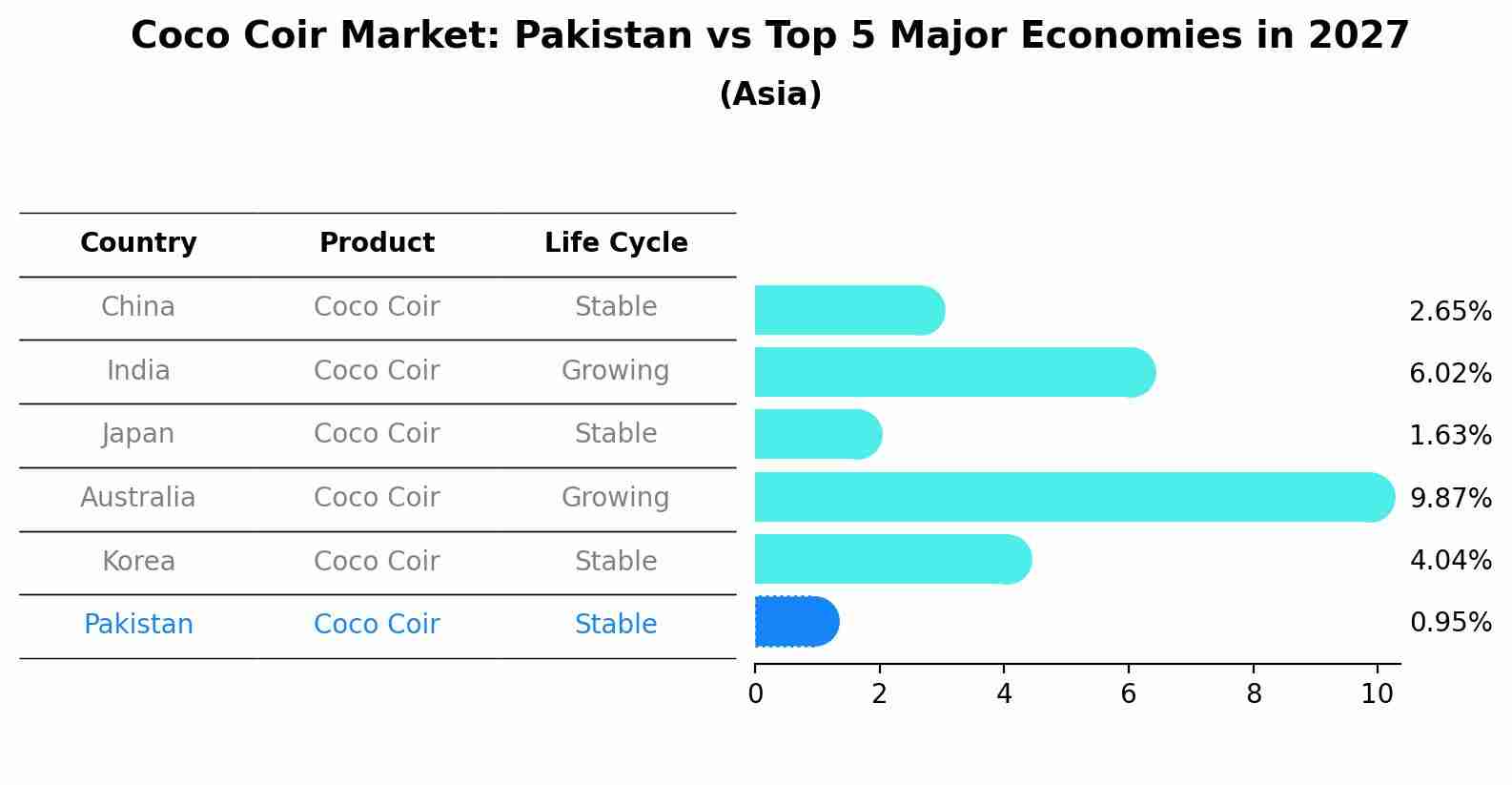Pakistan Coco Coir Market (2025-2031) Outlook | Forecast, Value, Industry, Share, Revenue, Size, Growth, Analysis, Companies & Trends
| Product Code: ETC373717 | Publication Date: Aug 2022 | Updated Date: Jul 2025 | Product Type: Market Research Report | |
| Publisher: 6Wresearch | Author: Dhaval Chaurasia | No. of Pages: 75 | No. of Figures: 35 | No. of Tables: 20 |
Pakistan Coco Coir Market Size Growth Rate
The Pakistan Coco Coir Market is likely to experience consistent growth rate gains over the period 2025 to 2029. Commencing at 0.78% in 2025, growth builds up to 1.40% by 2029.

Coco Coir Market: Pakistan vs Top 5 Major Economies in 2027 (Asia)
The Coco Coir market in Pakistan is projected to grow at a stable growth rate of 0.95% by 2027, within the Asia region led by China, along with other countries like India, Japan, Australia and South Korea, collectively shaping a dynamic and evolving market environment driven by innovation and increasing adoption of emerging technologies.

Pakistan Coco Coir Market Synopsis
The Pakistan Coco Coir market has been experiencing steady growth due to the increasing demand for eco-friendly and sustainable growing mediums in the agriculture and horticulture sectors. Coco coir, a byproduct of coconut processing, is gaining popularity as an alternative to peat moss and soil due to its superior water retention, aeration, and nutrient-holding capacities. The market is driven by the rising awareness among farmers and gardeners about the benefits of coco coir in improving soil structure and promoting plant growth. Additionally, the government`s initiatives to promote organic farming practices and the growing trend towards urban gardening are further fueling the market growth. Key players in the Pakistan Coco Coir market are focusing on product innovation, quality assurance, and expanding distribution channels to capitalize on the increasing demand.
Pakistan Coco Coir Market Trends
The Pakistan Coco Coir Market is experiencing a growing demand due to the increasing popularity of organic and sustainable gardening practices. Consumers are seeking environmentally-friendly alternatives to traditional soil mediums, leading to a surge in the use of coco coir as a soil conditioner and growing medium. Additionally, the rising awareness about the benefits of coco coir, such as its water retention properties, aeration capabilities, and biodegradability, is driving its adoption among both commercial growers and home gardeners in Pakistan. As the agriculture sector in the country focuses on enhancing productivity and reducing environmental impact, the Pakistan Coco Coir Market is poised for further growth in the coming years, with opportunities for innovation and diversification in product offerings.
Pakistan Coco Coir Market Challenges
In the Pakistan Coco Coir market, some challenges include the lack of awareness among farmers about the benefits of using coco coir as a growing medium, the relatively higher initial investment required for switching to coco coir from traditional growing mediums, and the limited availability of high-quality coco coir products in the local market. Additionally, issues related to inconsistent quality standards, transportation costs, and competition from other growing mediums further hinder the widespread adoption of coco coir in Pakistan. Overcoming these challenges would require targeted educational campaigns to raise awareness, strategic partnerships to improve product availability and quality, as well as efforts to make coco coir more cost-effective and accessible to farmers across the country.
Pakistan Coco Coir Market Investment Opportunities
Investment opportunities in the Pakistan Coco Coir market include setting up coco coir processing facilities to meet the growing demand for this sustainable alternative to traditional peat moss. With increasing awareness of environmental sustainability, the demand for coco coir is on the rise in Pakistan, driven by its benefits such as water retention, aeration, and biodegradability. Investing in research and development to explore new applications and product innovations in coco coir could also provide a competitive edge in the market. Additionally, partnering with local farmers for the sourcing of coconut husks, which are the raw material for coco coir production, can create opportunities for collaboration and support local communities. Overall, the Pakistan Coco Coir market presents promising investment prospects for those looking to capitalize on the growing trend towards eco-friendly and sustainable products.
Jordan Agar Market Government Policies
The government of Pakistan does not have specific policies targeting the Coco Coir market. However, the overall agricultural policy framework in Pakistan, including initiatives to promote sustainable agriculture and enhance agricultural productivity, indirectly impacts the Coco Coir market. The government provides support to the agriculture sector through subsidies on inputs, crop insurance schemes, and infrastructure development. Additionally, the Pakistan Agricultural Research Council (PARC) conducts research and development activities to improve agricultural practices, which can benefit Coco Coir producers. While there are no direct policies focusing on the Coco Coir market, the broader agricultural policies and initiatives in Pakistan play a role in shaping the operating environment for Coco Coir producers and exporters.
Pakistan Coco Coir Market Future Outlook
The Pakistan Coco Coir market is expected to witness steady growth in the coming years due to increasing awareness about sustainable agricultural practices and the rising demand for organic and eco-friendly products. The use of coco coir as a soil amendment and growing medium in agriculture is gaining popularity among farmers and gardeners in Pakistan, driven by its benefits such as water retention, aeration, and biodegradability. Additionally, the government`s initiatives to promote organic farming and the growing trend of urban gardening are further expected to fuel the market growth. As more consumers prioritize environmental consciousness and look for alternatives to traditional peat moss, the Pakistan Coco Coir market is poised for expansion in the foreseeable future.
Key Highlights of the Report:
- Pakistan Coco Coir Market Outlook
- Market Size of Pakistan Coco Coir Market, 2024
- Forecast of Pakistan Coco Coir Market, 2031
- Historical Data and Forecast of Pakistan Coco Coir Revenues & Volume for the Period 2021 - 2031
- Pakistan Coco Coir Market Trend Evolution
- Pakistan Coco Coir Market Drivers and Challenges
- Pakistan Coco Coir Price Trends
- Pakistan Coco Coir Porter's Five Forces
- Pakistan Coco Coir Industry Life Cycle
- Historical Data and Forecast of Pakistan Coco Coir Market Revenues & Volume By Product for the Period 2021 - 2031
- Historical Data and Forecast of Pakistan Coco Coir Market Revenues & Volume By Coco Coir Grow Bags for the Period 2021 - 2031
- Historical Data and Forecast of Pakistan Coco Coir Market Revenues & Volume By Bales for the Period 2021 - 2031
- Historical Data and Forecast of Pakistan Coco Coir Market Revenues & Volume By Coir Material for the Period 2021 - 2031
- Historical Data and Forecast of Pakistan Coco Coir Market Revenues & Volume By Open Tops for the Period 2021 - 2031
- Historical Data and Forecast of Pakistan Coco Coir Market Revenues & Volume By Blends & Loose Substrate for the Period 2021 - 2031
- Historical Data and Forecast of Pakistan Coco Coir Market Revenues & Volume By Others for the Period 2021 - 2031
- Historical Data and Forecast of Pakistan Coco Coir Market Revenues & Volume By Application for the Period 2021 - 2031
- Historical Data and Forecast of Pakistan Coco Coir Market Revenues & Volume By Rope & Cordage for the Period 2021 - 2031
- Historical Data and Forecast of Pakistan Coco Coir Market Revenues & Volume By Coco Nets & Twines for the Period 2021 - 2031
- Historical Data and Forecast of Pakistan Coco Coir Market Revenues & Volume By Stitched Mats for the Period 2021 - 2031
- Historical Data and Forecast of Pakistan Coco Coir Market Revenues & Volume By Coconut Meals for the Period 2021 - 2031
- Historical Data and Forecast of Pakistan Coco Coir Market Revenues & Volume By Husk for the Period 2021 - 2031
- Historical Data and Forecast of Pakistan Coco Coir Market Revenues & Volume By Others for the Period 2021 - 2031
- Historical Data and Forecast of Pakistan Coco Coir Market Revenues & Volume By Consumer for the Period 2021 - 2031
- Historical Data and Forecast of Pakistan Coco Coir Market Revenues & Volume By Green Houses for the Period 2021 - 2031
- Historical Data and Forecast of Pakistan Coco Coir Market Revenues & Volume By Sellers for the Period 2021 - 2031
- Pakistan Coco Coir Import Export Trade Statistics
- Market Opportunity Assessment By Product
- Market Opportunity Assessment By Application
- Market Opportunity Assessment By Consumer
- Pakistan Coco Coir Top Companies Market Share
- Pakistan Coco Coir Competitive Benchmarking By Technical and Operational Parameters
- Pakistan Coco Coir Company Profiles
- Pakistan Coco Coir Key Strategic Recommendations
Frequently Asked Questions About the Market Study (FAQs):
- Single User License$ 1,995
- Department License$ 2,400
- Site License$ 3,120
- Global License$ 3,795
Search
Thought Leadership and Analyst Meet
Our Clients
Related Reports
- Canada Oil and Gas Market (2026-2032) | Share, Segmentation, Value, Industry, Trends, Forecast, Analysis, Size & Revenue, Growth, Competitive Landscape, Outlook, Companies
- Germany Breakfast Food Market (2026-2032) | Industry, Share, Growth, Size, Companies, Value, Analysis, Revenue, Trends, Forecast & Outlook
- Australia Briquette Market (2025-2031) | Growth, Size, Revenue, Forecast, Analysis, Trends, Value, Share, Industry & Companies
- Vietnam System Integrator Market (2025-2031) | Size, Companies, Analysis, Industry, Value, Forecast, Growth, Trends, Revenue & Share
- ASEAN and Thailand Brain Health Supplements Market (2025-2031) | Strategy, Consumer Insights, Analysis, Investment Trends, Opportunities, Growth, Size, Share, Industry, Revenue, Segments, Value, Segmentation, Supply, Forecast, Restraints, Outlook, Competition, Drivers, Trends, Demand, Pricing Analysis, Competitive, Strategic Insights, Companies, Challenges
- ASEAN Bearings Market (2025-2031) | Strategy, Consumer Insights, Analysis, Investment Trends, Opportunities, Growth, Size, Share, Industry, Revenue, Segments, Value, Segmentation, Supply, Forecast, Restraints, Outlook, Competition, Drivers, Trends, Demand, Pricing Analysis, Competitive, Strategic Insights, Companies, Challenges
- Europe Flooring Market (2025-2031) | Outlook, Share, Industry, Trends, Forecast, Companies, Revenue, Size, Analysis, Growth & Value
- Saudi Arabia Manlift Market (2025-2031) | Outlook, Size, Growth, Trends, Companies, Industry, Revenue, Value, Share, Forecast & Analysis
- Uganda Excavator, Crane, and Wheel Loaders Market (2025-2031) | Strategy, Consumer Insights, Analysis, Investment Trends, Opportunities, Growth, Size, Share, Industry, Revenue, Segments, Value, Segmentation, Supply, Forecast, Restraints, Outlook, Competition, Drivers, Trends, Demand, Pricing Analysis, Competitive, Strategic Insights, Companies, Challenges
- Rwanda Excavator, Crane, and Wheel Loaders Market (2025-2031) | Strategy, Consumer Insights, Analysis, Investment Trends, Opportunities, Growth, Size, Share, Industry, Revenue, Segments, Value, Segmentation, Supply, Forecast, Restraints, Outlook, Competition, Drivers, Trends, Demand, Pricing Analysis, Competitive, Strategic Insights, Companies, Challenges
Industry Events and Analyst Meet
Whitepaper
- Middle East & Africa Commercial Security Market Click here to view more.
- Middle East & Africa Fire Safety Systems & Equipment Market Click here to view more.
- GCC Drone Market Click here to view more.
- Middle East Lighting Fixture Market Click here to view more.
- GCC Physical & Perimeter Security Market Click here to view more.
6WResearch In News
- Doha a strategic location for EV manufacturing hub: IPA Qatar
- Demand for luxury TVs surging in the GCC, says Samsung
- Empowering Growth: The Thriving Journey of Bangladesh’s Cable Industry
- Demand for luxury TVs surging in the GCC, says Samsung
- Video call with a traditional healer? Once unthinkable, it’s now common in South Africa
- Intelligent Buildings To Smooth GCC’s Path To Net Zero


















